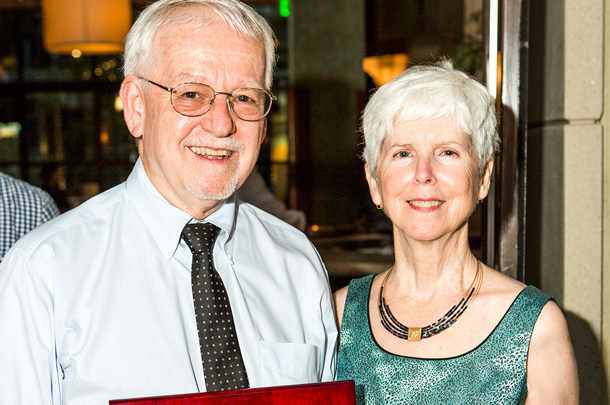The Herman Ostrow School of Dentistry has received a financial boost — and a new name for its Special Patients Clinic — thanks to a donation from Roseann Mulligan and Glenn Clark.
The official announcement was made on Oct. 13 to a crowd of Ostrow faculty, staff and alumni celebrating the clinic’s 30th anniversary at an elegant reception in Downtown Los Angeles.
The gift provides the clinic with an endowment that will fund the operation for years to come.
The new name — the Dr. Roseann Mulligan Special Patients Clinic — pays tribute to Mulligan (known as Nan). Her vision and leadership not only helped start the program, which is one of the first school-based dental clinics for patients with special needs, but also has kept it running for three decades.
“I’ve always been interested in caring for the oral health needs of those patients who couldn’t get treatment elsewhere,” said Mulligan, who is Ostrow’s associate dean of community health programs and hospital affairs.
She and her husband, Ostrow Professor Glenn Clark, decided to make a large gift that could make a real impact on the clinic’s permanence at the Herman Ostrow School of Dentistry.
“What we wanted most,” Clark said, “was for the patients treated by that clinic to get continuous care—this year, next year, 10 years, 15 years down the road, if possible.”
Clark and Mulligan approached Dean Sadan and Chief Development Officer Calen Ouellette with an idea to gift the Special Patients Clinic.
Sadan and Ouellette countered with an idea to rebrand the clinic with Mulligan’s name.
“It was only natural that Dr. Mulligan’s name be synonymous with Ostrow’s Special Patients Clinic,” Ouellette said, pointing out that it’s only under her constant leadership that the clinic has managed to thrive all these years.
In fact, since its beginnings, it is estimated that the clinic has provided dental care treatment to more than 14,000 special-needs patients, including the frail elderly as well as those with intellectual and developmental disabilities, neuromuscular disease and HIV-positive patients since the earliest days of the epidemic.
The clinic has also become a required rotation for DDS students, who must spend one week in the clinic, which Mulligan says has helped future dental practitioners grow confident providing care to this underserved population.
“Frequently, the students will volunteer to spend additional time in the clinic because they like working with the patients,” she said. “These patients are extremely appreciative of our caring for them, and the students really respond to that.”
Mulligan, who has worked at Ostrow since 1982, said that what she’s most enjoyed about her time at USC has been finding like-minded educators who are similarly committed to helping the underserved — the support she has received while developing unique clinics and educational partnerships that simultaneously benefit the community and the students.
— John Hobbs


